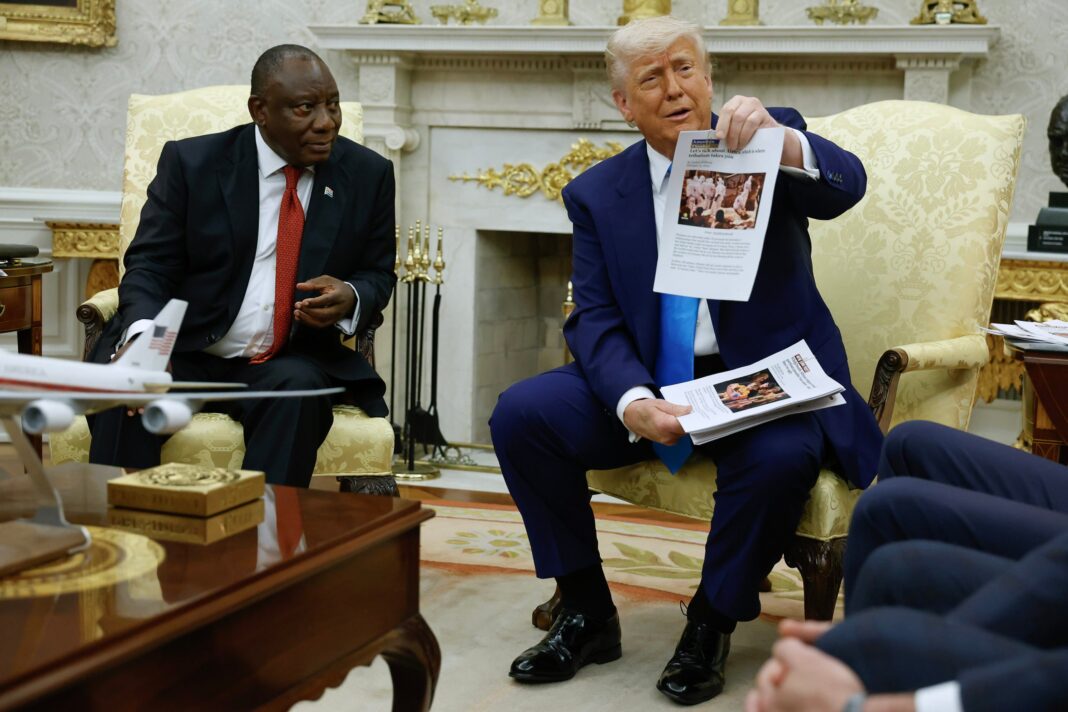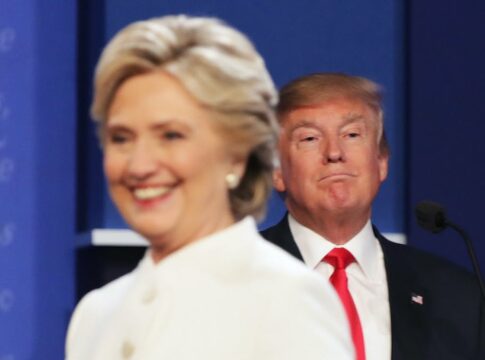A South African activist is urging U.S. leaders to back a peaceful secession by the country’s white Afrikaner minority, warning that South Africa is collapsing under violent crime, corruption and anti-white policies.
Ernst Roets, a filmmaker and spokesman for the advocacy group Lex Libertas, called South Africa a “failed state” in meetings this week with lawmakers and think tanks in Washington, D.C. He pointed to a wave of farm murders and what he described as race-based laws that punish Afrikaners, and asked U.S. officials to support a framework for self-governance. (RELATED: Inside Orania — South Africa’s Whites-Only Town)
Afrikaners — descendants of Dutch, German and French settlers — have lived in southern Africa since the 1600s and have developed a distinct language and culture. Lex Libertas argued in a statement that they should be recognized as an indigenous African nation. His group’s report proposes decentralization, cultural autonomy and sanctions on South African leaders who oppose the effort.
“If we are not indigenous to South Africa, the question is, into what country are we indigenous? We’re not indigenous to the Netherlands or to Germany or to France,” Roets told the Daily Caller.
WATCH:
The Afrikaner cause drew global attention after President Donald Trump warned South African President Cyril Ramaphosa during a White House meeting of a “genocide” against the country’s white minority. Ramaphosa dismissed this claim, arguing that violent crime affects all races in South Africa and that black citizens are also frequent victims.
The Daily Caller’s on-the-ground reporting has documented the brutality and racial targeting behind South Africa’s farm attacks, which disproportionately impact the Afrikaner minority. (RELATED: Investigating Farm Killings In South Africa — What We Saw)
Lex Libertas argues the deeper problem is political: a centralized system unable to reflect the country’s deep ethnic and cultural divisions. The group calls for South Africa to be reimagined not as a single nation but as a region of distinct peoples.
South Africa, the report argues, is best understood not as a single nation but as a region whose size and diversity rival Western Europe’s. Before 1910 it was a patchwork of Boer republics and British colonies alongside African kingdoms and tribal territories, all of which are now jammed under one highly centralized state.
“It’s one of the most ethnically diverse regions in the world,” Roets told the Caller. “Probably with a variety of not just cultural communities living there, or nations, you could say, but also different civilizations.”
WASHINGTON, DC – MAY 21: U.S. President Donald Trump holds up a printed article from “American Thinker” while accusing South Africa President Cyril Ramaphosa of state-sanctioned violence against white farmers in South Africa during a press availability in the Oval Office at the White House on May 21, 2025 in Washington, DC. (Photo by Chip Somodevilla/Getty Images)
In light of that reality, the group argues, “the only sustainable solution for South Africa lies in the decentralization of the political system in order to facilitate autonomy and self-governance for the various nations living in South Africa.”
Roets said solutions could range from cultural or territorial autonomy to full secession, depending on Pretoria’s willingness to cooperate. Lex Libertas argues the overhaul would benefit all South Africans — not just Afrikaners — by shifting prosperity from a “dysfunctional” central government to self-reliant cultural communities, and it demands five core reforms: repeal of race-based laws, recognition of traditional authorities, equal application of the justice system, secure property rights, and prosecution of officials who incite violence against minorities.
To press for these changes, Roets was dispatched to Washington to rally international support for what the group calls an “ultimatum” to South Africa’s ruling elite.
Among the actions Lex Libertas is calling for: public and diplomatic pressure, targeted sanctions on South African officials, exemptions from tariffs for companies not participating in the Black Economic Empowerment (BEE) program, and strict conditions on future trade deals and government loans.
The group is also seeking U.S. recognition of the Afrikaner push for self-governance as a legitimate political cause, along with investment in parallel institutions, protection for activists and formal negotiations with Pretoria toward a self-rule agreement.
While insisting they’re not asking America to solve South Africa’s internal problems, Lex Libertas argues that U.S. involvement is in Washington’s strategic interest.
In support of @POTUS Executive Orders, DRL just returned from a trip to South Africa to learn more about rural farm attacks and the breakdown of rule of law. Here’s what we found🧵[1/6]
— Bureau of Democracy, Human Rights, & Labor (DRL) (@StateDRL) July 28, 2025
Roets told the Caller that U.S. involvement could counter South Africa’s anti-American posture on the global stage, pointing to the country’s voting patterns at the United Nations and deepening economic ties with BRICS. He argued that Washington should support “pro-American nations living within South Africa,” and warned of the global fallout from a failed South African state — including mass migration and greater Chinese influence across the continent. (RELATED: A Warning: What South Africa Can Teach Americans About Preserving Their Freedom)
“What we are asking from America is not much,” Roets said. “But if America does something that isn’t much, it could still have tremendous positive consequences for us.”
The stakes, he added, are high. Roets said four of his colleagues were previously investigated for treason after similar outreach efforts in the U.S.
“It’s not treason to criticize your government,” Roets said, acknowledging the risk of retaliation but insisting it’s a risk worth taking. “I cannot predict how they would respond to that. It is foreseeable that there will be complaints of treason, which, of course, would be ridiculous, because it’s not treason.”
He described South Africa as “a region inhabited by a long list of nations” that became the petri dish of a failed “globalist experiment that tells us that we need to abandon cultural [and] national identities.”
“We would rather fight to the death than dissolve who we are,” Roets said.




